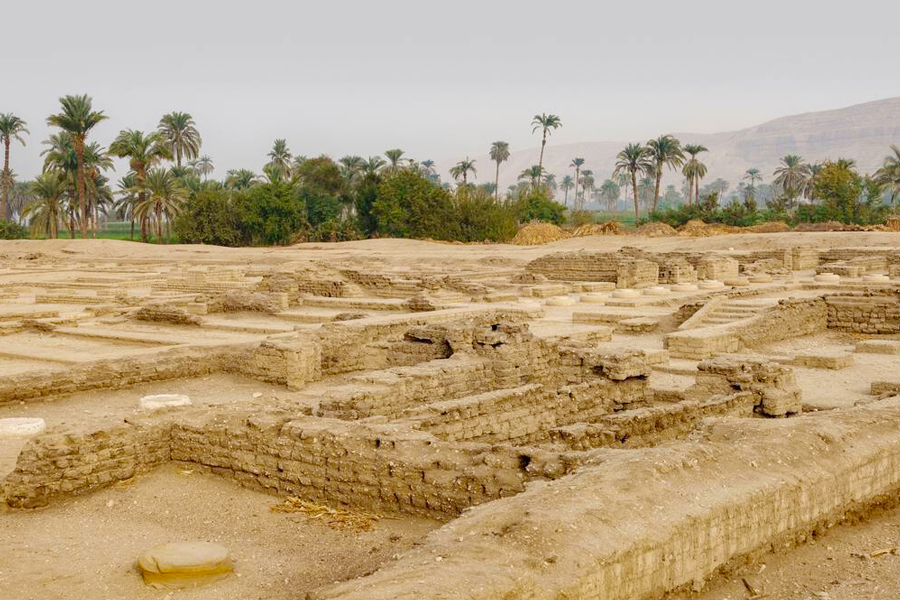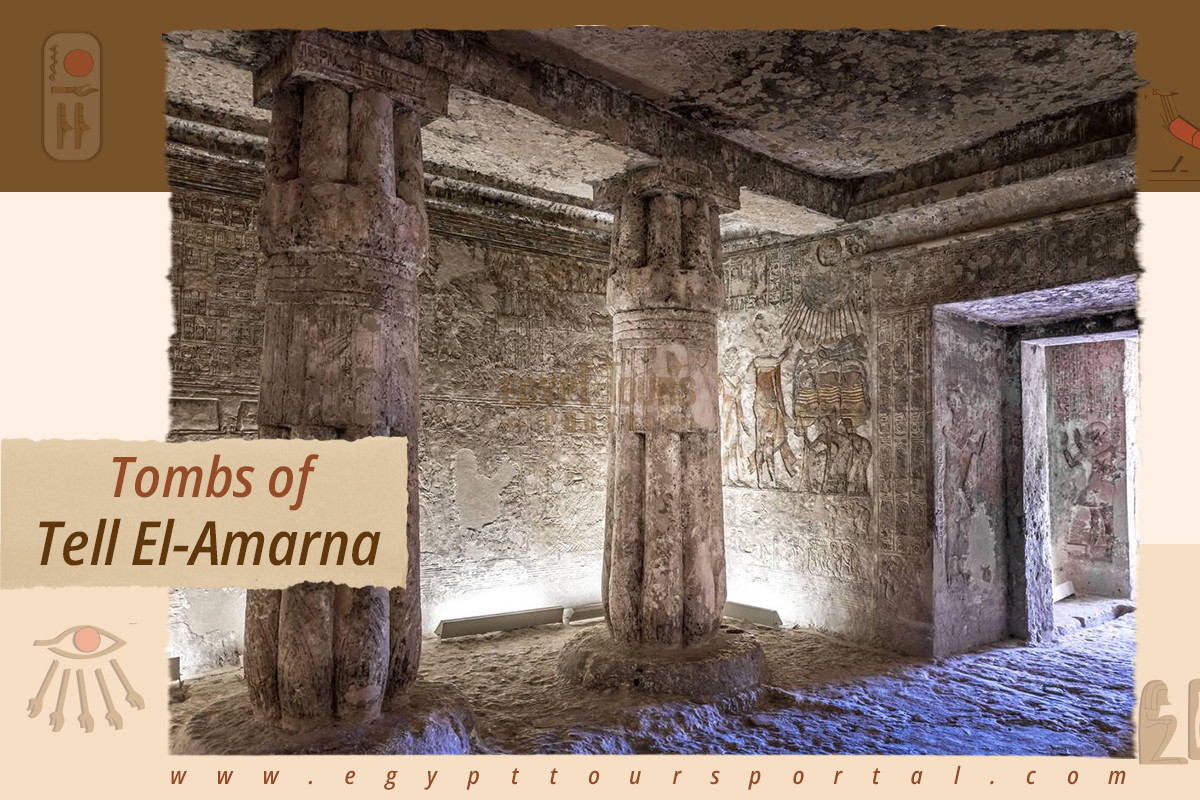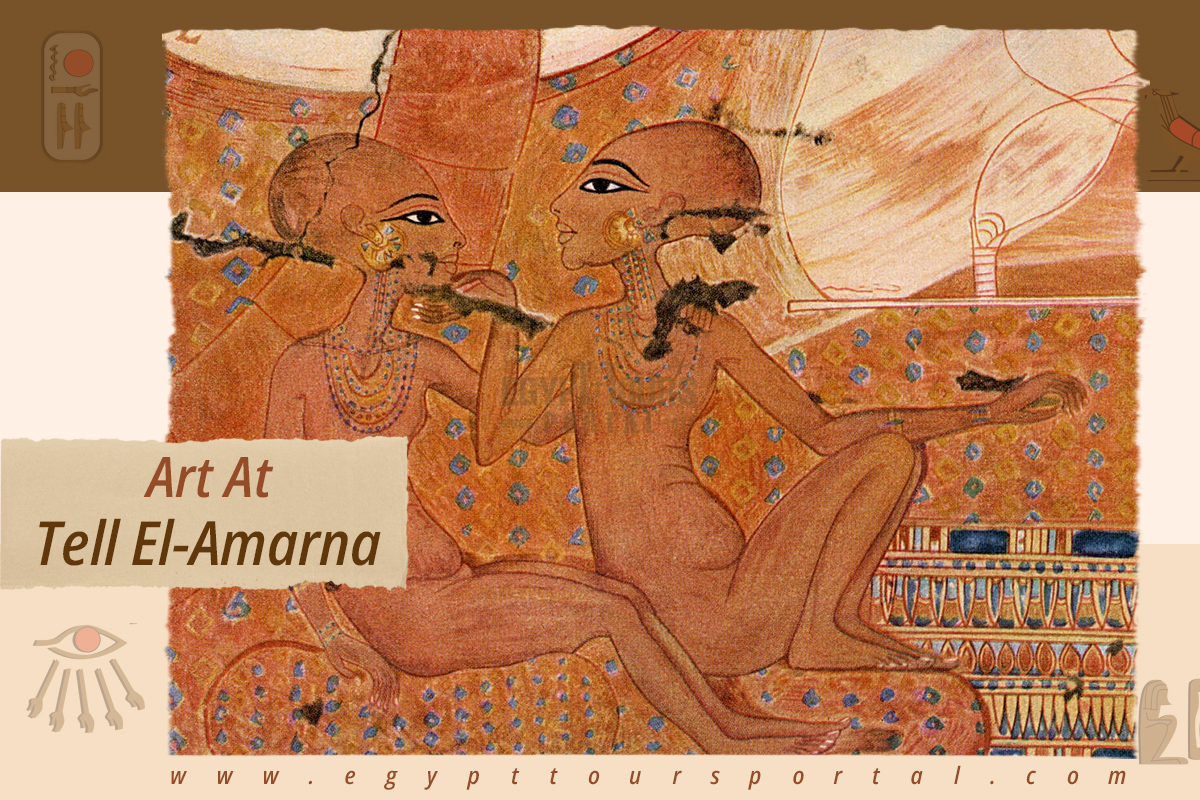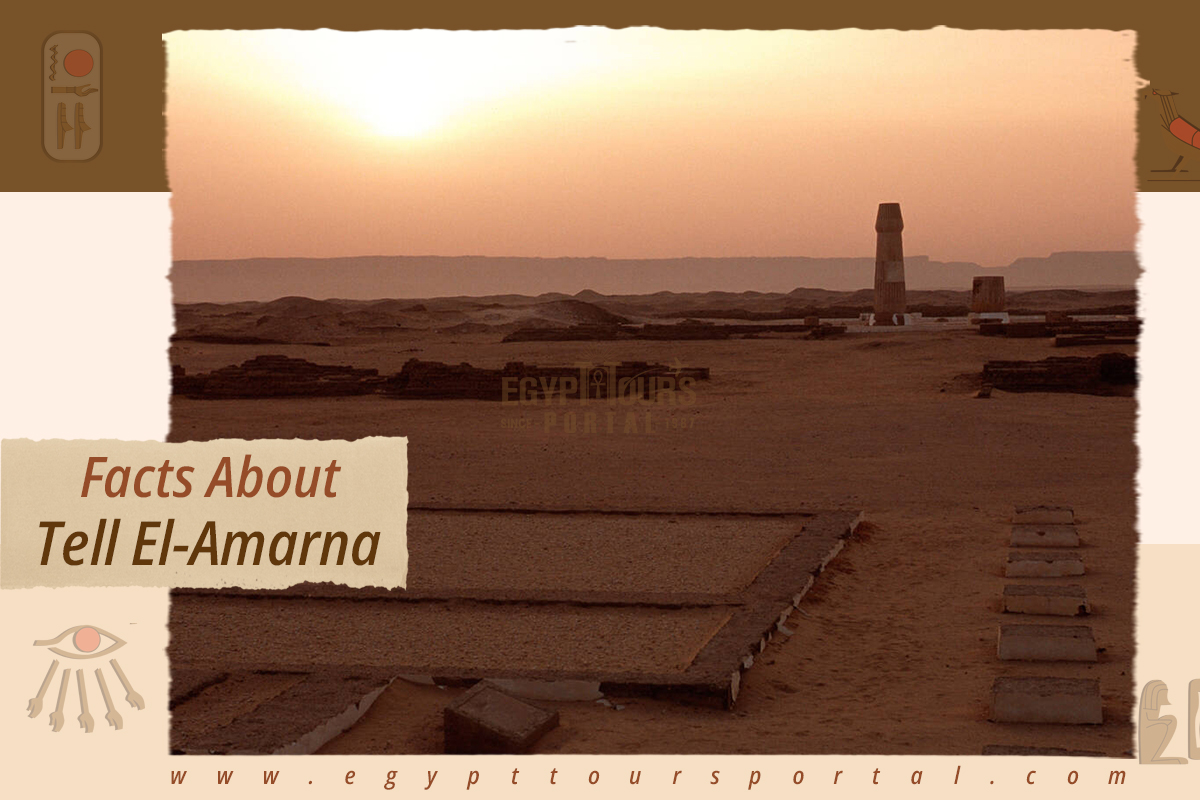Explore the ancient city of Tell El-Amarna, a captivating archaeological site in Egypt. Uncover the remnants of Akhenaten's revolutionary reign and the fascinating history of this once-thriving capital, where archaeology meets a glimpse into the enigmatic world of ancient Egypt.

| Overview | |

|
|
| Location | Minya Governorate, Egypt |
| Region | Upper Egypt |
| Builder | Akhenaten |
| Founded | Approximately 1346 BC |
| Periods | Amarna Period |
Tell El-Amarna is a terrific spot of the tombs & ruins of the magical Akhetaton’s city and it is located in Upper Egypt, around 44 miles north of Asyut city & 36 miles from the city of Al-Minya. Akhenaten "Amenhotep IV" managed to build that city around 1348 BC to be his kingdom’s new capital especially when he left the worship of god Amun and devoted himself to worshiping Aton.
After 4 years after the death of Akhenaton, the throne got back to the city of Thebes, and Tell El-Amarna was abandoned. There are lots of villages located on the east side of Amarna.

Tell El-Amarna, one of the ancient Egyptian cities, was established by King Akhenaton and Queen Nefertiti, the wife of the king to become the center of the cult of God Aten. Its great ruins & remains are scattered now over the land and attract a huge number of tourists to know more and more about that fascinating site.
Trip to Tel Amarna & Beni Hassan from Cairo escorted by one of our highly qualified Egyptologists guide and A/C vehicle. Read More!!!
Read MoreAmong the most interesting things to check is the hypnotic temple of God Aten. It has a distinguished style & shape since it had a sanctuary without a roof designed that way especially to allow the sun rays to enter the complex and show the power of the sun god, Aten and that is different from the other temples that have roofed sanctuaries & chambers.
The city of Tell El Amarna city is found on the eastern bank of the Nile River in the Minya Province. It is found 312 km (194 mi) south of the city of Minarets Cairo, 58 km (36 mi) south of Minya, and 02 km (250 mi) north of the golden city of Luxor. The city was established in 1346 BC to be the worship center for Pharaoh Akhenaten’s "The Horizon of the Aton".

King Amenhotep IV who was called Akhenaton was the 10th Pharaoh of the 18th dynasty in ancient Egypt during the New Kingdom. His ruling period is known to be among the most controversial periods in the whole history of Egypt, and he reigned from 1352 BC till 1336 BC.
He managed to build many buildings and left various archeological finds such as the beautiful portrait busts of Queen Nefertiti, and around 300 cuneiform tablets that were discovered by a peasant woman in 1887.

Among the most fascinating parts of the Tell El-Amarna historical site today are the two sections of cliff tombs that are located at the ends of Akhet Aton’s ancient city. The carvings & the wall paintings of those tombs are really interesting, and they reflect Egypt’s visitors to have a look at the unique art of the New Kingdom. Here is a list of the most interesting tombs that are located in Tell-El-Amarna:
In the northern section of Tell-El-Amarna, you will find some of the most fascinating decorated tombs including Huya's tomb who was the Royal Harem’s superintendent. It is a really remarkable tomb and is famous for its scenes of the owner of the tomb while offering services to the royal family.
Read the most important information about ancient Egyptian tombs, also explore the most famous ancient Egyptian tombs in Luxor and Aswan.
Read MoreIt is considered one of the most attractive decorated tombs all around Tell El-Amarna with its amazing colors. Mery Re was the high priest of the temple of the Sun God, Aten and it is displayed in the tomb. There are also some reliefs on the eastern section of the tomb’s wall that display Akhenaton performing religious rituals while worshiping Aten.
It is located in the northern section of the Tell El-Amarna ruins, and it is not accessible like the other tombs of the city, but it is such a terrific place tourist site to visit. Aye was the vizier of Egypt during the reign of King Akhenaton. He was actually one of the favorite royal officials of the king. It is one of the most beautiful tombs in Tell El-Amarna because of its glamorous paintings that are spread all over the tomb’s inner walls including a famous scene of Aye and his wife while receiving the honor from the king & his wife.

The Amarna Letters are an incredible collection of correspondence from the 14th century BC between rulers from ancient Egypt and the Near East which was the oldest vision of international diplomacy. All the letters were focused on a number of topics, which included friendship declarations, diplomatic marriages, and material exchanges. The Amarna Letters are regarded as the first known international diplomatic system, which contained many conventions and rules for seeking negotiation and lines of communication. They developed a number of ancient forms of written communication, which was a key factor in growing and expanding many relationships with great powers in the Near East for the purpose of creating a peaceful international atmosphere that lasted for centuries.
The letters mentioned the names of many of the rulers of the 18th dynasty who predate the Amarna period by a century, including Amenhotep III, Akhenaten, and possibly Smenkhkare or Tutankhamun. The letters show the Egyptians expanded their empire into new territories like Amurru, Damascus, Byblos, and Qadesh vassals of Egypt that displayed the Pharaoh's authority and loyalty. The letters were able to shed light on how ancient Egyptian civilization developed over time, plus improving our knowledge of the distant past and the concept of Isolation during ancient times. The Amarna letters are made of 382 clay tablets, which were geographically and chronologically organized.
The Letters were able to offer insights into the linguistic capabilities of that time period. The letters show in great detail the exchange between great powers and independent kingdoms like Babylon, Mitanni, Hatti, and Assyria who as documented, maintained equal relationships and incredible communication patterns. The letters are found in various museums around the world in Egypt, the United States, and Europe.

The excavations of Tell el Amarna took place around the 18th and 19th centuries when many explorers and scholars searched and documented the area. The first excavation in the city took place in 1714 AD and then continued during Napoleon's expedition in Egypt between 1798 and 1799. The city was mapped by an English group of archaeologists around 1824, and then the southern tombs were uncovered in the area around 1833. A Prussian expedition between 1843 and 1845 explored the area, which created marvelous records and drawings.
Around 1887, over 300 cuneiform tablets known as the Amarna Letters were discovered by local women which can shed light on the incredible diplomatic correspondence of the Pharaoh in Akkadian. This discovery shed light on the significance of the ancient city of Amarna. In the late 19th century and the 20th century, great independent excavations were done which led to the discovery of cuneiform tablets and artifacts. A number of boundary stelae and private tombs from the great city of Amarna were discovered. One of the greatest discoveries that took place in the northern and southern parts of the area was made by Ludwig Borchardt as part of the Deutsche Orientgesellschaft expedition from 1907 to 1914 which led to the discovery of famous artifacts like the bust of Nefertiti.
The excavations continued after the end of World War I. The Egyptian Exploration community returned to excavate from 1921 to 1936 which was incredibly focused on royal and religious structures. The excavations continued around the 1960s by the Egyptian Antiquities Organization and all across the 21st century, a cemetery near the tombs of the nobles was discovered later in the 80s. The reliefs from the royal tomb were copied with a number of other objects. The many excavations and research led to the understanding of Amarna's history, art, culture, and significance.

The houses of Tell El Amarna contained many types of houses that ranged from small mudbricks for the common people to more elaborate buildings for the elite. All the houses had different architectural designs featuring smaller temples with open sanctuaries exposed to the sun and numerous altars. It contained many multiple courtyards, rooms, and storage areas.
The houses of the rich and elite were decorated with a number of colorful frescoes and also had amenities like gardens and private chapels. The temples had no closing doors and were very different in their design. Many of the houses and temples were reused by creating a number of epic constructions and works of art again in Thebes.

The art of Tell El Amarna is the most incredible aspect of the area which came to be around the reign of Akhenaten (1351–1334 BC) in the 18th Dynasty of the New Kingdom. The art was incredibly marked by a total shift in its depictions and subject matter, as it became center-focused on Akhenaten's religious reforms and the monotheistic worship of the sun disc Aton. The remnants of Amarna art are still found in the same area after Akhenaten's death. The art itself is renowned for its active and dynamic representations.
The art featured incredible figures with raised heads, overlapping figures, and crowded scenes. The body held a number of marvelous characteristics, which included swaying and slender postures, exaggerated extremities, and distinctive visions for Pharaoh Akhenaten, including feminine qualities like great hips and breasts. Feet, Hands, and facial structures are depicted with detail and elongation. The art in the tombs was very prevalent which showed incredible images of Aton plus there were no displays or any of the traditional funerary scenes.
The sculptures and statues had a unique artistic shape, which included an untraditional skull shape plus elongated heads, necks, limbs, plus large ears and lips which are seen across the statue of Akhenaten himself. Amarna’s art had a central core known as the Sun god Aton which is symbolized by the key of life "The Ankh". One of the biggest lasting artistic innovations is the sunk relief carving, which was used extensively at the time. The finest piece of art found in Amarna is the legendary Nefertiti Bust, which was found in the studio of the Royal Court Sculptor Thutmose and can now be found in Berlin.

Discover the magic of ancient Egypt in 2025! Reserve your spot for our exclusive Egypt tours 2025. Delve into the secrets of Tell El-Amarna and explore iconic historical sites firsthand. Set sail on the iconic Nile River and unlock the secrets of Egypt's past aboard our best Nile cruise. Don't miss out on this extraordinary adventure - book now and journey through the wonders of ancient civilization!
Private 4 Days Cairo Tour Packages 4 days Cairo Egypt tour package will offer a bles...
Tour Location: Cairo – Giza...
Stunning 5 Days Cairo and Alexandria Tour Package 5 days Cairo and Alexandria tour p...
Tour Location: Cairo/Giza/Alexandria...
Exceptional 6 Days Cairo, Luxor & Aswan Tour Package 6 days Cairo, Luxor & A...
Tour Location: Cairo/Giza/Aswan/Luxor...
Amazing 7 Days Cairo and Hurghada Holiday 7 Days Cairo & Hurghada holiday will e...
Tour Location: Cairo – Giza – Hurgh...
The word tell is Arabic, which means hill or mound, and Amarna is the name of the area. The name is translated into the hill of Amarna.
Tell El Amarna is a highly significant archaeological wonder famous for its cultural and religious greatness in the Amarna Period. The site has a magnificent wealth of textual artifacts and archaeological marvels that uncover a lot of facts about the diplomacy, art, and culture of this unique time period. The city of Amarna is known for its letters, which are famous for shedding light on the diplomatic relations in the ancient Near East.
Amarna style is an artistic style that emerged during the reign of Pharaoh Akhenaten in his own capital, which he called Amarna.
Amarna art is known for its naturalistic display and highly intimate portrayal of the Pharaoh and all of his family members. It was able to provide a sense of personal connection with the subjects and intimacy, which stands away from the common conventions of traditional Egyptian art.
The Amarna Period is widely famous for the religious revolution that was started by Akhenaton to call for the worship of one god known as Aton, “The Sun Disk” which was mentioned in detail in the Tell el-Amarna Letters and all the different art.
Pharaoh Akhenaton attempted to change the religious fabric of Egyptian society by promoting the worship of one god known as the sun god Aten, effectively shifting from polytheism and the worship of many gods to a form of monotheism.
The unique style of Amarna has different characteristics of peer-shaped bodies and elongated skulls with skinny arms and torsos but with fuller hips, thighs, and stomachs. All the artwork was designed to showcase the connection between the sun god Aton and the Pharaoh.
The number of Amarna Letters is around 382, which have the shape of clay tablets filled with diplomatic correspondence from different foreign rulers and officials.
Amarna Art Style is known for its distinctive artistic conventions. The style is known to represent the change in the religious belief system and the special individuality of the pharaoh, plus his own family.
The incredible city of Amarna was created by Pharaoh Akhenaten, also known as Amenhotep IV (1353–1336 BC) in order to become his capital.
The creation of Amarna City started as a magnificent religious revolution that held the worship center for the sun god Aton, who possessed some of marvelous works of unique art that conveyed many meanings.
The Amarna art style was known for many amazing features that held naturalistic and elongated portrayals of the human body, a complete focus on Akhenaten and his pharaoh, plus the sun god Aton. It was a complete departure from the common conventions of traditional ancient Egyptian art.
The entire country of Egypt deserve to be explored with its every heavenly detail but there are places that must be seen before any other such as the breathtaking Hurghada's red sea, The wonders of Cairo the pyramids of Giza, the great sphinx, the Egyptian Museum, Khan El Khalili Bazaar, the wonders of Luxor like Valley of the Kings, Karnak & Hatshepsut temple and the wonders of Aswan such as Abu Simbel temples, Philea temple, Unfinished obelisk and The Wonders of Alexandria like Qaitbat Citadel, Pompey's Pillar and Alexandria Library. Read more about the best places to visit in Egypt.
If you want to apply for a Visa On Arrival that lasts for 30 days then you should be one of the eligible countries, have a valid passport with at least 6 months remaining and pay 25$ USD in cash, as for the E-Visa for 30 day you should have a valid passport for at least 8 months, complete the online application, pay the e-visa fee then print the e-visa to later be presented to the airport border guard. You could also be one of the lucky ones who can obtain a free visa for 90 days. Read more about Egypt travel visa.
Egypt has a variety of delicious cuisines but we recommend “Ful & Ta’meya (Fava Beans and Falafel)”, Mulukhiya, “Koshary”, a traditional Egyptian pasta dish, and Kebab & Kofta, the Egyptian traditional meat dish.
The best time to travel to Egypt is during the winter from September to April as the climate becomes a little tropical accompanied by a magical atmosphere of warm weather with a winter breeze. You will be notified in the week of your trip if the Climate is unsafe and if any changes have been made.
You should pack everything you could ever need in a small bag so you could move easily between your destinations.
We have been creating the finest vacations for more than 20 years around the most majestic destinations in Egypt. Our staff consists of the best operators, guides and drivers who dedicate all of their time & effort to make you have the perfect vacation. All of our tours are customized by Travel, Financial & Time consultants to fit your every possible need during your vacation. It doesn't go without saying that your safety and comfort are our main priority and all of our resources will be directed to provide the finest atmosphere until you return home.
You will feel safe in Egypt as the current atmosphere of the country is quite peaceful after the government took powerful measures like restructuring the entire tourist police to include all the important and tourist attractions in Egypt. Read more about is it safe to travel to Egypt.
Wear whatever feels right and comfortable. It is advised to wear something light and comfortable footwear like a closed-toe shoe to sustain the terrain of Egypt. Put on sun block during your time in Egypt in the summer to protect yourself from the sun.
The best activity is by far boarding a Nile Cruise between Luxor and Aswan or Vise Versa. Witness the beauty of Egypt from a hot balloon or a plane and try all the delicious Egyptian cuisines and drinks plus shopping in old Cairo. Explore the allure and wonders of the red sea in the magical city resorts of Egypt like Hurghada and many more by diving and snorkeling in the marine life or Hurghada. Behold the mesmerizing western desert by a safari trip under the heavenly Egyptian skies.
There are a lot of public holidays in Egypt too many to count either religious or nation, the most important festivals are the holy month of Ramadan which ends with Eid Al Fitr, Christmas and new years eve. Read more about festivals & publich holidays in Egypt.
Egypt is considered to be one of the most liberal Islamic countries but it has become a little bit conservative in the last couple of decades so it is advised to avoid showing your chest, shoulders or legs below the knees.
Arabic is the official language and Most Egyptians, who live in the cities, speak or understand English or at least some English words or phrases. Fewer Egyptians can speak French, Italian, Spanish, and German. Professional tour guides, who work in the tourism sector, are equipped to handle visitors who cannot speak Arabic and they will speak enough English and other languages to fulfill the needs of all our clients.
The fastest way is a car, of course, a taxi. If you are in Cairo ride a white taxi to move faster or you could board the fastest way of transportation in Egypt metro if the roads are in rush hour.
The temperature in Egypt ranges from 37c to 14 c. Summer in Egypt is somehow hot but sometimes it becomes cold at night and winter is cool and mild. The average of low temperatures vary from 9.5 °C in the wintertime to 23 °C in the summertime and the average high temperatures vary from 17 °C in the wintertime to 32 °C in the summertime. The temperature is moderate all along the coasts.
It is the home of everything a traveler might be looking for from amazing historical sites dating to more than 4000 years to enchanting city resorts & beaches. You will live the vacation you deserve as Egypt has everything you could possibly imagine.









